US Conducts Defensive Strikes Against Iran’s Houthi Militia In Yemen
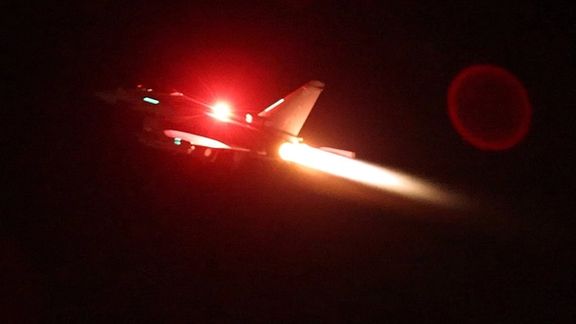
The United States has carried out five defensive strikes in regions of Yemen under the control of the Iranian-backed Houthi militia.

The United States has carried out five defensive strikes in regions of Yemen under the control of the Iranian-backed Houthi militia.
According to a statement from US Central Command released on Sunday, it targeted three mobile anti-ship cruise missiles, one unmanned underwater vessel, and one unmanned surface vessel on Saturday, citing an imminent threat to US Navy ships and merchant vessels in the area.
"This is the first observed Houthi employment of a UUV since attacks began on Oct. 23," CENTCOM stated in a post on X.
The conflict in the Red Sea area has escalated, with Houthi attacks being a major aspect of the spreading conflict in the Middle East, sparked by the Hamas attacks on Israel on October 7 and Israel’s subsequent bombardment of Gaza.
While the Houthis claim their attacks are in solidarity with Palestinians amid the Gaza war, the US and its allies view them as indiscriminate and a threat to global trade.
Meanwhile, a spokesperson for the Houthi rebel group, Yahya Saree, claimed in a post on social media platform X on Monday that their militants shot down a United States MQ9 aircraft "with a suitable missile while it was carrying out hostile missions."
Saree also mentioned targeting the United Kingdom's RUBYMAR ship in the Gulf of Aden, stating that "as a result of the extensive damage the ship suffered, it is now at risk of sinking." He assured that the ship's crew "exited safely."
For over a decade, Iran has been providing weapons and support to the Houthis. The rebel group has been engaged in conflict with the Yemeni government since 2014 and has controlled a significant portion of the country for some time.
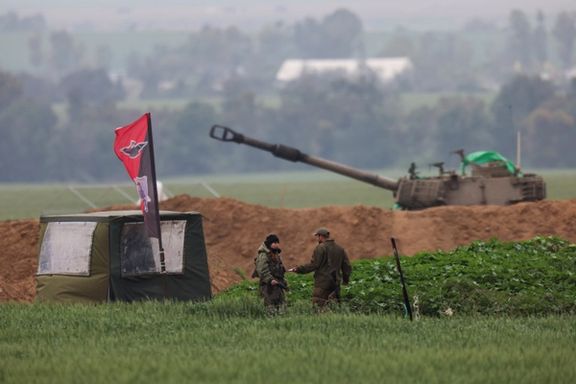
Israeli experts closely monitoring Iran perceive the defeat of Hamas as pivotal in curbing the influence of Iran and Hezbollah’s aggressive tendencies.
In recent months, Israel and the Iran-backed Hezbollah have engaged in daily cross-border skirmishes following a deadly attack by Hamas on October 7, that killed 1,200 Israelis and ignited the Gaza war.
Yaakov Katz, renowned author of “Weapon Wizards: How Israel Became a High-Tech Military Superpower,” emphasized the pressing need for Israel to establish a stable and secure post-war environment in Gaza, preventing Hamas from regaining control. He believes that “The biggest challenge for Israel is creating a post war reality in Gaza that is stable and secure and doesn’t see Hamas regain control. Iran is obviously going to continue to stoke the flames and try to undermine anything that is meant to provide security for Israel.”
Katz added “And for that reason, we need to have a mechanism in place that can deny Iran that ability to continue to spread terrorism and chaos through the Gaza Strip that can then launch attacks against Israel. For that to happen, Israel needs to be involved at least in providing security control over the Gaza Strip.”
Israel is slated to seize the Gaza Strip’s southernmost border town of Rafah in an effort to secure the release of the over 100 hostages held by Hamas and root out the last vestiges of the jihadi Sunni group.
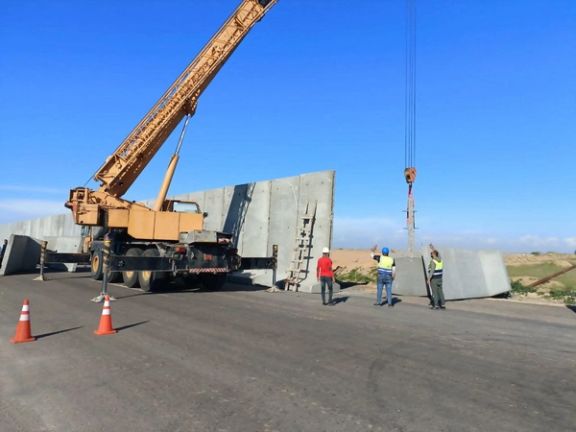
The Tehran-born Beni Sabti, from the Israeli National Security and Strategy Institute, told Iran International that there are two views on what the end of Hamas spells for Hezbollah.
“Some experts think that defeating Hamas bring a high level of deterrence for Israel. If Hamas is destroyed it will be a good thing against Hezbollah. They will be deterred, and it will decrease confrontations with Israel.”
Sabti shared the view that dismantling Hamas could serve as a deterrent to Hezbollah, prompting the militant group to reconsider its aggressive stance.
According to a Reuters report, France proposed a ceasefire deal that seeks to end the clashes on the Israeli-Lebanese border. A key element of the proposal would require Hezbollah’s elite unit to withdraw 6 miles from the border. Hezbollah rejected the plan and its General-Secretary Hassan Nasrallah previously said his Shiite militia’s attacks on Israel will end when Israel stop its “aggression” in Gaza.
Sabti emphasized Hezbollah's formidable arsenal of 150,000 missiles, representing a potent threat compared to Hamas.
The extensive rocket arsenal amassed by Hezbollah since the 2006 war was a focal point of Nasrallah's recent speech, where he boasted of precision-guided missiles capable of targeting all of Israel.
Nasrallah said in a televised speech last week that Hezbollah has a “huge arsenal” of precision-guided missiles that can target all Israeli territory “from Kiryat Shmona to Eilat.” Kiryat Shmona is in northern Israel and Eilat is the country’s southernmost city.
Sabti stressed the importance of Hezbollah’s withdrawal from the border for de-escalation, arguing that “Israel is not seeking war with Lebanon because the damage will be very great.”
Both Israeli viewpoints “agree that the outcome with Hamas will have repercussions for Hezbollah,” potentially altering the dynamics in the region, Sabti emphasized.
However, an alternative view held by a minority in Israel, according to Sabti, argues that “If Hamas is defeated, Hezbollah will feel a duty to make more trouble with Iran’s support,” potentially triggering a more destructive war.
Yigal Carmon, former counter-terrorism advisor to Israeli prime ministers Yitzhak Shamir and Yitzhak Rabin, said Lebanon will face immense damage to its infrastructure if Hezbollah launches a war against Israel. Carmon told Iran International that Israel “will bomb the sewage, the water and the electricity centers of Lebanon, “turning its capital into a uninhabitable wasteland.
In late December, Israeli war cabinet minister Benny Gantz said, “I am sure that [Hassan] Nasrallah is looking at what is happening here [in Gaza] and does not want it to happen to him [in Lebanon].”
Israel fought a 34-day war in 2006 with Hezbollah in response to the Iran-backed group’s kidnapping of two Israeli soldiers.
Iran International was the first news media to publish on September 5 Carmon’s early warning that one of Iranian proxy movements would invade Israel in September or October. Carmon is the founder and president of the Middle East Media Research Institute (MEMRI).
In a February policy paper for the Washington Institute for Near East Policy titled “Reinforcing U.S. Diplomacy to Stop a Hezbollah-Israel War,“ Hanin Ghaddar writes “Israel cannot return its citizens to the north without security guarantees, and Hezbollah cannot make major compromises without securing significant gains to advance its regional role and Iran’s interests. Such dynamics increase the likelihood of a widening conflict.”
Almost 100,000 Israelis have been compelled to flee their homes in the north due to Hezbollah’s bellicosity.
The possibility of edging closer to a high-intensity conflict gained momentum following remarks by Gantz on Sunday. Gantz stated, "Israel will achieve our objectives and remove Hezbollah from our border towns" along the Lebanese border. He further suggested that Hezbollah is at a crossroads, contemplating whether to "commit organizational suicide."
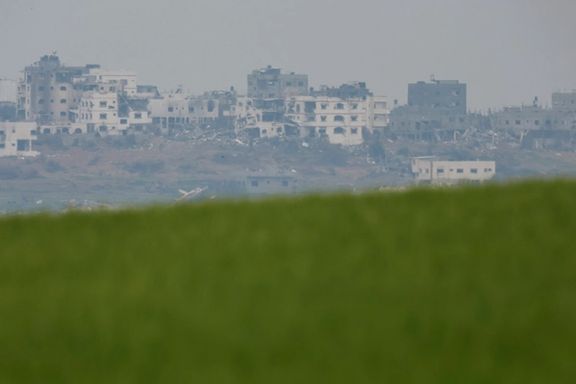
The Gaza-Israel conflict has significant implications for Iran's already strained economy, characterized by currency devaluation, reduced government revenues, and high inflation.
Iran’s involvement in the regional conflict hinders its economic growth efforts, further reduces the value of the Iranian rial, and decreases government income. Additionally, it has worsened economic problems such as inflation, diminishing oil exports, and weaker GDP growth.
The falling value of the rial is the direct result of fears about a wider war involving Iran. Domestic investors hedge their bets by buying US dollars and other currencies, part of which is sent abroad, exacerbating an already high rate of capital flight.
On February 15th, the Institute of International Finance (IIF) released a report on the Global Economic Fallout of a Regional War. According to the report, a pessimistic scenario could lead to a 0.4 percentage point decrease in global growth compared to the baseline scenario in 2024, resulting in a 2.4% global growth rate.
In this pessimistic scenario, the Middle East faces dire consequences, including potential disruptions to oil production, tight monetary policies in GCC countries, and damage to infrastructure in Lebanon and Israel. Egypt's economy could suffer from decreased cargo passing through the Suez Canal. Iran's economy may contract by around 5%, with inflation exceeding 100%.
Despite Iranian officials' repeated statements about staying out of a larger regional conflict, its proxy armed groups continue provocations that could lead to a direct confrontation with Israel and/or the United States. This could cause disruptions in shipping in the Strait of Hormuz, affecting oil flow.
The Gaza conflict significantly affects the global logistics and supply chain industry, particularly in the Middle East, raising concerns about shipping bottlenecks, increased freight rates, and erratic delivery schedules, disrupting the flow of goods and materials.
Iran's involvement in the Gaza crisis has significant economic implications. It may stir up nationalist sentiments at home and divert attention from its own economic challenges by supporting organizations like Hamas in Gaza. Furthermore, the conflict between Israel and Gaza not only has an immediate impact on the local economy but also has the potential to reshape the Middle East and North Africa region, affecting travel, commerce, investment, and energy sectors.
The International Monetary Fund (IMF) has underscored the adverse economic impact of Iran's participation in the Gaza conflict on local and regional businesses.
The Houthi's miscalculation that attacks on ships in the Bab-el-Mandeb strait and the Red Sea would go unpunished was debunked as the US and UK intervened, targeting Houthi positions. According to the IMF, the cost of shipping products from Asia to Europe, bypassing the Suez Canal due to Houthi strikes, has doubled.
Iran Economy
Iran's economy has significantly deteriorated over the past decade due to sanctions, corruption, and inefficiency, contrasting with the growth of other regional economies.
According to the IMF, if the destabilizing activities of Iran’s proxies persist, it could result in significant damage to the global economy, with Lebanon and Iran bearing the brunt of the impact.
The attacks by Iran-backed Houthi militants, along with controlled strikes by international coalition forces against their positions, has already caused Yemen's economy to contract by 1.2% last year, with further decline expected this year.
The IMF cautions that if the Gaza conflict escalates, Yemen's economy could shrink by up to 8% in 2024, while Iran and Lebanon might face GDP declines of 5% and 20%, respectively.
Furthermore, the potential for trade disruptions in the Strait of Hormuz looms if Iran becomes directly involved in the Gaza conflict. A significant portion of the world's liquefied gas (13%) and oil (35%) exports pass through this crucial waterway, with potential global energy price spikes.
Even if Iran were to temporarily succeed in blocking the Strait of Hormuz, it would ultimately harm itself. Notably, these southern waterways serve also as a major transit route for Iran's non-oil imports and exports.
Referring to IMF data, it's important to highlight that Iran's GDP has dropped by 40% from 2010 to the present day, whereas both Turkey and Saudi Arabia currently have GDPs that are more than three times larger than Iran's.

According to the Institute of International Finance (IIF)'s pessimistic scenario, there could be a contraction of 0.4 percentage points in global growth compared to the baseline scenario in 2024. This decline is primarily attributed to the heightened probability of disruptions in shipping routes via the Strait of Hormuz and the Suez Canal, particularly if Iran or its allies interfere with oil exports through the latter.
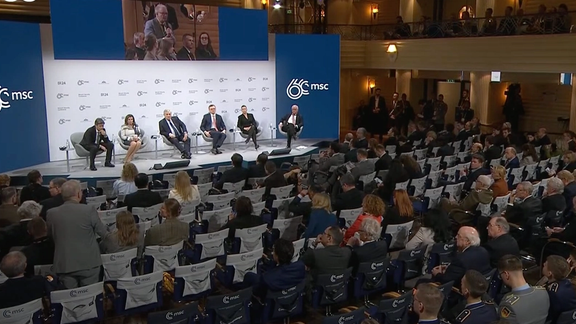
In spite of Iran's absence from one of the world's leading security conferences, the regime remained among the top topics in the fight against terror.
Approximately 50 heads of state and government, alongside around 100 ministers participated in this year's Munich Security Conference, the second consecutive year that Tehran and Moscow did not receive invitations.
The event took place against the backdrop of Iran's proxy war with militias wreaking havoc across the Middle East in alliance with the Islamist group Hamas, which invaded Israel on October 7, killing 1,200 mostly civilians and capturing at least 250 hostages into Gaza.
Iran was excluded from the conference last year following violent protests in 2022 during which hundreds were killed, including numerous children, and thousands more detained. The nationwide demonstrations erupted following the death in custody of 22-year-old Mahsa Amini at the hands of Iran’s hijab police, representing one of the most significant challenges to the clerical regime since its establishment 45 years ago.
Russia's exclusion from this year's conference has been linked to its continued invasion of Ukraine, which began in February 2022. However, this year the event was overshadowed by the mysterious death of Russian opposition leader Alexei Navalny in Russia’s Penal Colony No. 3 just above the Arctic Circle on Friday.
As has become the norm in events about international security, participants of the Munich conference engaged in intense discussions regarding Iran's human rights violations, destabilizing activities and its role in global conflicts. Additionally, concerns were raised about Iran's supply of drones and missiles for the Russian invasion of Ukraine, a partnership that has exacerbated tensions in the region and raised alarm among international security experts.
Referring to the current Middle East conflict that has been spiraling across the region since the October 7 attack by Iran-backed Hamas, US Secretary of State Antony Blinken emphasized the need to contain Iran to have “an integrated region where people are actually working together for the common good.”
He described Iran as “the number one threat” to the security of Israel as well as the security of many other countries, saying that this is only possible if “Iran is isolated along with all of its proxies.”
“That future, that path is there, it’s clear, it’s hard, it’s complicated, but it’s real. The alternative is an endless repetition of the cycle that we’ve seen year after year, decade after decade, generation after generation,” he stated.
Prominent Iranian activist Masih Alinejad was one of many calling for the designation of Iran's Revolutionary Guard (IRGC) as a terrorist organization, a step already taken by the United States. How can we reach peace and security in the world without designating the Revolutionary Guards as a terrorist organization?", she said, the military organization involved in almost all the regime’s activities in Iran and abroad.
Alinejad highlighted the human rights abuses perpetrated by the IRGC domestically, citing the case of Kosar Eftekhari, a protester who lost her eyesight after being shot by security forces during a crackdown in 2022, as emblematic of the regime's brutality. “I am here today with a woman who was in the front line of last year’s uprising ... she lost her eyes because of the Revolutionary Guards,” she told the audience.
“The Islamic Republic is helping Putin, is helping Hamas, all the proxies in Yemen... unfortunately, dictators are more united than democratic countries.” She urged a common strategy to isolate Islamic Republic and “address (Iran’s Supreme Leader Ali) Khamenei and his gang of killers the way that you address (Russian President Vladimir) Putin," she said.
German Foreign Minister Annalena Baerbock explained the legal constraints hindering the designation of the IRGC as a terrorist organization in the European Union. While acknowledging Iran's destabilizing activities, Baerbock emphasized the importance of adhering to the rule of law and the need for sufficient evidence to justify such a designation under European legal frameworks.
Her remarks have sparked anger from activists who reiterated that there is sufficient evidence and no legal obstacle for such an action. The European Parliament voted overwhelmingly in favor of a measure calling for the European Union to designate the IRGC as a terrorist organization in January 2023.
Unlike the United States which in 2019 under former President Donald Trump put the IRGC on its Foreign Terrorist Organizations (FTO) list, European countries have avoided the designation in the past few years and prioritized diplomacy with the Islamic Republic in the hope of concluding a nuclear deal. However, it has only emboldened the regime which has in the last year banned the UN's nuclear inspectors, freed up frozen funds in a hostage exchange with the US, and accelerated its nuclear program.
Additionally, in the last two years alone, dozens of IRGC plots have been foiled by countries including the UK, US, Israel, Cyprus and Argentina, with calls from the world's leading security and intelligence leaders to take action. In the UK, the head of MI5 called Iran one of the country's biggest threats last year after revealing the scale of plots foiled on British soil, calling it "the state actor which most frequently crosses into terrorism".
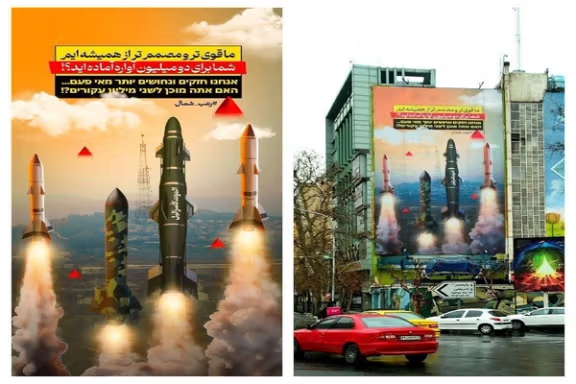
Iran's authorities have unveiled a new mural in Tehran's Palestine Square, featuring threats directed at Israel amidst a regional proxy war flamed by the regime.
The mural, adorned with images of missiles and phrases in Persian and Hebrew, sends a message: "We are stronger and more determined than ever", amidst a proxy war which since October has seen Iran's militias across the region launch attacks on both Israel and its ally, the US.
Iran-backed Hamas invaded Israel on October 7, and since Israel's relentless retaliation which has blitzed Gaza, proxies in Lebanon, Syria, Iraq and Yemen have joined in solidarity with the Palestinian militia.
The latest unveiling in Tehran follows a similar display last month, accompanied by a stern warning of a "severe response", referring to the bombardment of Gaza. The actions echo the Islamic Republic's long standing anti-West, anti-Israel ideology, rooted in decades of propaganda dating back to its establishment in 1979.
Supreme Leader Ali Khamenei's 2015 declaration that "Israel must be destroyed in 25 years" reflects the regime's unwavering commitment to the goal. Despite widespread mockery from Iranians, the regime persists in its rhetoric, justifying vast support for militant groups like Hamas and Hezbollah.
However, the effectiveness of the propaganda appears to be waning, as many Iranians now express opposition to the government's stance. The sentiment is particularly evident in the ongoing Gaza conflict, where Iranians are openly supporting Israel and rejecting the regime's narratives.
The shift in public opinion reflects growing concerns about the potential consequences of Iran's aggressive stance towards Israel, including the possibility of a deadly conflict entangling the region.
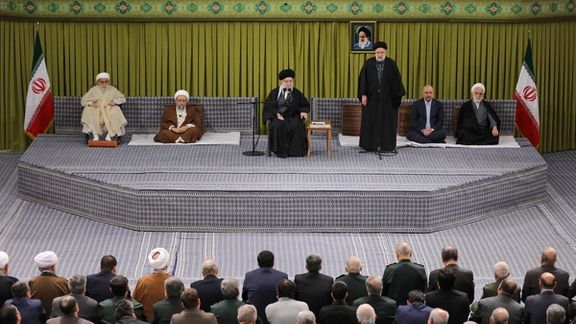
Iran's ruler, Ali Khamenei, made a fervent appeal for voter turnout in the March 1 elections, amidst indications of a potential low participation rate, signaling a declining legitimacy.
In a meeting with supporters from East Azarbaijan Province Sunday morning, Khamenei called for self-reflection and “enhancing existing strengths while addressing weaknesses.” He claimed that the United States and other “enemies” want a low turnout in the elections and urged people to vote for those candidates who have been allowed to run by his obedient watchdog institutions.
While the regime’s hardcore has barred hundreds of loyal insiders from running in the elections for parliament and the Assembly of Experts, it has been trying hard to galvanize enthusiasm among a disgruntled and apathetic public. Many clerics have been recruited to urge voters to go to polling stations, praising the achievements of the regime. Even hijab rules have been relaxed for showing up at polling stations with the hope that perhaps more women will turn out.
One more sign of the regime’s need to project popularity is repeated claims that millions of people took part in the 45th anniversary of the Islamic Republic earlier in the month. Photographic evidence posted on social media showed a crowd of a few tens of thousands in Tehran. Khamenei, however, thanked the citizens on Sunday for their overwhelming presence.
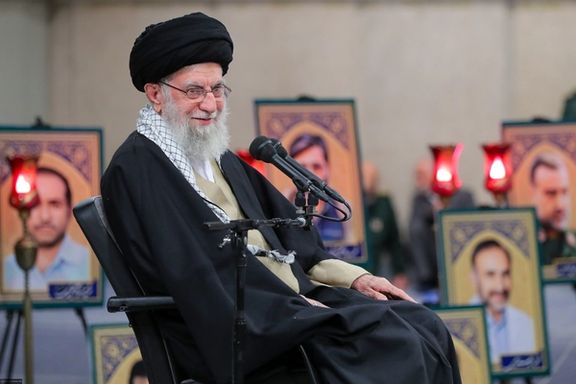
Also, government media in headlines announcing Khamenei’s meeting said “thousands of people” attended his speech. But the meeting was held in his residence and office, where a large reception hall can accommodate a few hundred people, not thousands.
The aging autocrat now in his 35th year of rule, could not resist on Sunday to speak again and again about “enemies”. He told his followers that Iran should have a “smart and non-reactive approach to the enemy.” Emphasizing the importance of the elections as a solution to problems, he called on everyone to enthusiastically participate. However, many Iranians say that repeated parliamentary and presidential elections have done little to change policies that have crippled the economy and further restricted freedoms.
With mass disqualification of candidates, few see the elections as offering a real political choice, at least within the confines of Islamic Republic’s already restricted landscape. But Khamenei claimed on Sunday that all previous elections were genuine.
“Of course, throughout these decades, electoral violations in the sense claimed by the enemy have never been observed, rendering their claims baseless. In cases where some allegations were raised, upon investigation, they were identified. However, these violations never altered the overall results, and elections in the country have always been conducted correctly, soundly, and maturely,” Khamenei insisted.
In 2009, a short time after polls closed in presidential elections authorities announced that Mahmoud Ahmadinejad was re-elected. Millions of people saw this as a fraudulent result and poured into the streets demanding a real recount. After months of protests, the other two candidates were put under house arrest without tirl. They are in their 80s now and still confined in their homes.
In 2021, all major presidential candidates were disqualified and barred from challenging Ebrahim Raisi, Khamenei’s favorite man for the position, who won the vote and formed a hardliner front with those in parliament who had been also elected in non-competitive circumstances.
Khamenei also admitted that Iran’s isolated and government-controlled economy is not performing well, but at the same time he called for preventing Western influences.